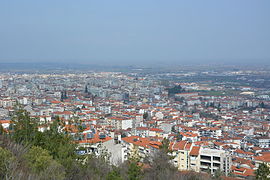
Back فيريا Arabic فيريا ARZ Бер Bulgarian Veria Breton Véria Catalan Véroia CEB Veria Danish Veria German Βέροια Greek Veria Spanish
Veria
Βέροια | |
|---|---|
 Panoramic view | |
| Coordinates: 40°31′N 22°12′E / 40.517°N 22.200°E | |
| Country | Greece |
| Administrative region | Central Macedonia |
| Regional unit | Imathia |
| Government | |
| • Mayor | Konstantinos Vorgiazidis[1] (since 2014) |
| Area | |
| • Municipality | 796.5 km2 (307.5 sq mi) |
| • Municipal unit | 359.1 km2 (138.6 sq mi) |
| Elevation | 128 m (420 ft) |
| Population (2021)[2] | |
| • Municipality | 62,655 |
| • Density | 79/km2 (200/sq mi) |
| • Municipal unit | 46,976 |
| • Municipal unit density | 130/km2 (340/sq mi) |
| Time zone | UTC+2 (EET) |
| • Summer (DST) | UTC+3 (EEST) |
| Postal code | 591 31, 591 32 |
| Area code(s) | 2331 |
| Vehicle registration | ΗΜ |
| Website | www.veria.gr |
| Official name | Archaeological Site of Aigai (modern name Vergina) |
| Includes |
|
| Criteria | Cultural: (i)(iii) |
| Reference | 780 |
| Inscription | 1996 (20th Session) |
| Area | 1,420.81 ha (3,510.9 acres) |
| Buffer zone | 4,811.73 ha (11,890.0 acres) |

Veria (Greek: Βέροια or Βέρροια, romanized: Véroia or Vérroia; Aromanian: Veria[3]), officially transliterated Veroia, historically also spelled Beroea or Berea,[4] is a city in Central Macedonia, in the geographic region of Macedonia, northern Greece, capital of the regional unit of Imathia. It is located 511 kilometres (318 miles) north-northwest of the capital Athens and 73 km (45 mi) west-southwest of Thessaloniki.
Even by the standards of Greece, Veria is an old city; first mentioned in the writings of Thucydides in 432 BC, there is evidence that it was populated as early as 1000 BC.[5] Veria was an important possession for Philip II of Macedon (father of Alexander the Great) and later for the Romans. Apostle Paul famously preached in the city, and its inhabitants were among the first Christians in the Empire. Later, under the Byzantine and Ottoman empires, Veria was a center of Greek culture and learning. Today Veria is a commercial center of Central Macedonia, the capital of the regional unit of Imathia and the seat of a Church of Greece Metropolitan bishop in the Ecumenical Patriarchate, as well as a Latin Catholic titular see.
The extensive archaeological site of Vergina (ancient Aegae, the first capital of Macedon), a UNESCO World Heritage Site containing the tomb of Philip II of Macedon, lies 12 km (7 mi) south-east of the city center of Veria.
- ^ "Municipality of Veria, Municipal elections – October 2023". Ministry of Interior.
- ^ "Αποτελέσματα Απογραφής Πληθυσμού - Κατοικιών 2021, Μόνιμος Πληθυσμός κατά οικισμό" [Results of the 2021 Population - Housing Census, Permanent population by settlement] (in Greek). Hellenic Statistical Authority. 29 March 2024.
- ^ Sterghiu, Hristu (10 January 2012). "Agenda aromână Retrospectiva 2011 II – 12.ian.10" (in Aromanian). Radio Romania International.
- ^
 Smith, William, ed. (1854–1857). "Berœa". Dictionary of Greek and Roman Geography. London: John Murray.
Smith, William, ed. (1854–1857). "Berœa". Dictionary of Greek and Roman Geography. London: John Murray.
- ^ veria.gr Veria:Its history (greek) Archived March 6, 2008, at the Wayback Machine accessed June 1, 2008.


